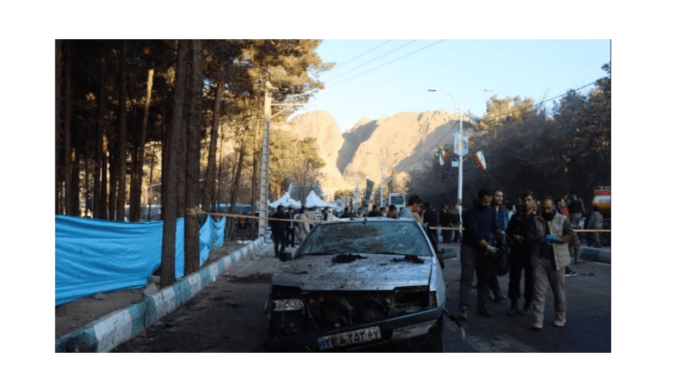“In a solemn commemoration held in memory of the assassination of a top general in Iran, more than 95 Iranians lost their lives in a terrorist attack, leaving several others injured, intensifying tensions in the already volatile Middle East.
It is unknown if the explosion was caused by any particular regional enemy, such as Israel or the (IS) Islamic State, but it happened at a memorial ceremony remembering the fourth anniversary of the demise of Major General Qasem Soleimani, the commander of Iran’s Al-Quds Force. The fallout increased the unrest in the area even more.
#BREAKING Several Iranian people have been injured so far in a stampede after they tried to run away following the loud explosion, Iran’s state TV reports. Videos show ambulances have arrived at the scene. https://t.co/HNRX88YZ6C pic.twitter.com/QfO62LArHi
— Iran International English (@IranIntl_En) January 3, 2024
Iran’s new Interior Minister, the hardliner Ahmad Vahidi, refrained from directly assigning blame for the attack and denied responsibility for the most impactful act of terrorism since the 1979 Iranian Revolution. The US State Department indicated no reason to trust Israel’s involvement. The initial death toll of 103 was later revised, with several of the wounded reported to be in critical condition, potentially increasing the number of casualties.
At a time when the Middle East could ill-afford another major incident, simultaneous to this event, tensions persisted between Hamas and Israel. Hamas accused Israel of a drone strike on Tuesday, resulting in the death of its deputy chief in Beirut, Lebanon. The attack caused casualties in heavily populated areas of the Lebanese capital.
Contrary to widespread terrorist attacks on civilians, Israel’s targeting of prominent military and scientific figures within Iran is a recurrent theme. Nonetheless, it has shifted its strategy since the retaliatory Hamas attacks on October 7th.
Israel signals a shift in strategy by holding Iran responsible for this. In the end, accountability is being reinterpreted.
Iran’s president stand:
President of Iran, Ibrahim Raisi, retorted, saying, ‘The enemies of the country should realize that such measures cannot cause a gap in the unshakable commitment of the Iranian population to preserve Islamic beliefs anytime.’ The attacks, he claimed, have ‘further bolstered Iran’s determination to confront violence and terrorism.’
Iran has supported proxy organizations instead of directly opposing Israel, displaying little intention to do so. AS per the officials, there were two remotely detonated devices that caused the blasts.
Within fifteen minutes of one another, explosions targeting a memorial service honoring Soleimani—once regarded as the most influential person in the Middle East—were reported by eyewitnesses in the southern city of Kerman. Soleimani was key factor in expanding Iran’s influence throughout Lebanon, Syria, and Iraq.
According to government sources, the first explosion occurred 700 meters from Soleimani’s mausoleum, and the second was 300 meters away. The official media in Iran reported 73 casualties initially, but the number increased rapidly in the afternoon. A day of mourning was declared on Thursday.
The explosions happened close to Martyrs’ Park, where Soleimani and 1,024 other people who were deemed martyrs were buried. This served as a destination for supporters of resistance against the US and the West. Hospitals in Kerman and surrounding areas have been placed on high alert for treating the injured.
Iranian Parliament’s Vice Speaker, Mojtaba Zolnour, claimed, ‘The non-suicidal nature of the terrorist attacks in Kerman indicates that this is an act of Zionist regime rulership. We will retaliate against Zionist rulership by changing it in such a way that will have a global precedent.’
During the COVID pandemic, former Health Ministry spokesperson Kianush Jahanpur had suggested on social media, ‘The response to this crime should only be made in Tel Aviv, not Tehran.’
Several world leaders, including Russian President Vladimir Putin, expressed limited sympathy, stopping short of identifying the perpetrator. Notably, there has been no impact on the US and UK warnings to Iran to cease its support for Houthi attacks on commercial shipping in the Red Sea following missile launches. Houthis promised to keep up their strikes until Israel lets additional supplies of humanitarian relief into Gaza.
At least 100 people were killed by an explosion on Wednesday near the tomb of Iranian Gen. Qasem Soleimani, the former leader of Iran’s Quds Force who was assassinated by a U.S. drone strike exactly four years ago, in what Iranian officials are calling a terrorist attack. pic.twitter.com/H04q7vHu8n
— Forbes (@Forbes) January 3, 2024
Soleimani, assassinated by an American drone on the orders of Donald Trump in 2020 in Baghdad, had been seen as a key figure directing Iranian proxy forces in Iraq, Syria, and elsewhere. His Shia militias, part of the Revolutionary Guards, and influential Iranian diplomats were formidable adversaries of the Sunni Islamic State group.
Expelled organizations, nationalist forces, and governmental agents could all be involved in the attack. Iran recently claimed to have eliminated a group supported by Israel’s intelligence agency, Mossad. On December 25, an Israeli airstrike in Syria resulted in the death of a top commander of Iran’s Revolutionary Guards near Damascus, prompting Tehran to warn of ‘certain consequences’ for Israel.
Iranian state media identified the commander, killed in the attack near Damascus, as Razi Mousavi, a senior advisor to the Al-Quds Force. Additionally, the ongoing conflict between Houthi rebels in Yemen and warnings from the US and UK against Iran’s support continued with no apparent effect on Iran’s policies.
